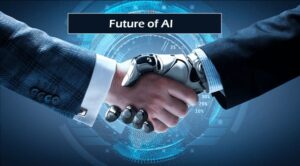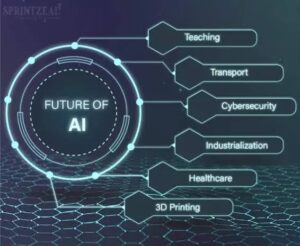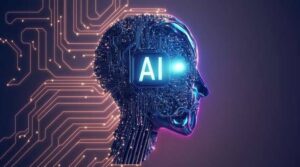The Future of AI: Trends to Watch in the Next Decade:
Artificial Intelligence (AI) has moved from the realms of science fiction into everyday life, transforming industries, driving innovation, and reshaping human interaction with technology. As we look toward the next decade, the future of AI promises to be even more transformative. Below, we’ll explore the key trends likely to shape AI’s trajectory and its broader impact on society.

Democratization of Artificial Intelligence
One of the most significant trends is the democratization of AI, making advanced tools and capabilities accessible to individuals and small businesses. Open-source platforms, low-code and no-code AI development tools, and affordable cloud-based AI services are eliminating the traditional barriers to entry. This trend is empowering a diverse range of creators and entrepreneurs, enabling them to leverage AI for innovative applications without needing deep technical expertise.
Key implications:
- Increased innovation across industries.
- The emergence of niche AI solutions tailored to specific audiences.
- A rise in AI startups competing with tech giants.
AI-Powered Healthcare Revolution
Healthcare is poised to benefit enormously from AI in the coming decade. Machine learning algorithms are becoming adept at diagnosing diseases, predicting patient outcomes, and personalizing treatment plans. AI is also playing a crucial role in drug discovery, reducing the time and cost required to bring new medications to market.
Transformative possibilities:
- Real-time health monitoring through wearable devices.
- Breakthroughs in precision medicine, tailoring treatments to individuals’ genetic profiles.
- Faster, more accurate disease detection, especially in underserved regions.
Despite its potential, ethical challenges, such as data privacy and AI bias, will need to be addressed to fully realize these benefits.
Generative AI: The Creativity Boom
Generative AI, popularized by tools like ChatGPT and DALL·E, is reshaping creative industries by enabling machines to produce text, images, music, and even video. Over the next decade, we can expect generative AI to become more sophisticated, and capable of creating hyper-realistic and nuanced content.
Applications to watch:
- Hyper-personalized advertising and marketing campaigns.
- AI-generated video games and virtual reality experiences.
- Content creation for journalism, film, and art.
The democratization of generative AI raises questions about copyright, originality, and misinformation, necessitating regulatory frameworks to govern its use.
AI and the Future of Work
AI is transforming workplaces, automating routine tasks, and augmenting human capabilities. While this shift is improving efficiency and reducing costs, it is also raising concerns about job displacement. However, the future is likely to see a hybrid approach, where humans and AI work collaboratively.
Future workplace trends:
- Upskilling initiatives to equip workers with AI-related skills.
- Increased use of AI for real-time decision-making and strategy development.
- Growth in AI-centric job roles, such as data ethicists, AI trainers, and automation specialists.
Organizations will need to invest in reskilling programs and ethical AI deployment to ensure that these changes benefit all stakeholders.

Autonomous Systems Take Center Stage
Autonomous vehicles, drones, and robots are set to become more prevalent and sophisticated. Advances in AI and edge computing are enabling machines to operate independently, making real-time decisions without human intervention.
Areas of impact:
- Transportation: Self-driving cars and trucks could revolutionize logistics and personal travel.
- Delivery services: Drones and robots could become the norm for last-mile delivery.
- Agriculture: Autonomous machines could optimize farming processes, from planting to harvesting.
AI in Climate Action
As the world grapples with the climate crisis, AI is emerging as a powerful tool to mitigate environmental challenges. From optimizing energy usage to predicting natural disasters, AI applications are helping to build a more sustainable future.
Promising developments:
- Smart grids and renewable energy optimization.
- AI-driven conservation efforts to monitor and protect biodiversity.
- Predictive analytics for disaster management and climate modeling.
The integration of AI with environmental initiatives could accelerate progress toward global sustainability goals.
Enhanced Natural Language Processing (NLP)
Natural Language Processing (NLP) has already made significant strides, but the next decade promises even greater advancements. Future NLP systems will likely exhibit deeper contextual understanding, emotional intelligence, and multilingual capabilities, making human-machine interactions more seamless.
Innovations to expect:
- More intuitive virtual assistants were capable of complex conversations.
- Real-time language translation with cultural nuance.
- AI-powered tools for mental health support and emotional well-being.
These developments will enhance accessibility and inclusivity, but they also require robust safeguards to prevent misuse and ensure fairness.
AI in Education
Education is another domain ripe for transformation through AI. Intelligent tutoring systems, personalized learning platforms, and automated grading are already making waves, and the future holds even more promise.
Potential impacts:
- Tailored learning experiences that adapt to individual student needs.
- Gamification and immersive learning through augmented and virtual reality.
- AI-driven analytics to predict and address learning gaps.
By bridging educational inequities and enabling lifelong learning, AI could revolutionize how knowledge is imparted and acquired.
Ethical AI and Responsible Development
As AI systems become more pervasive, ethical considerations will take center stage. Issues like algorithmic bias, data privacy, and AI’s impact on jobs and society demand proactive attention.
Key focus areas:
- Transparent and explainable AI systems to build public trust.
- Regulatory frameworks to govern AI deployment and usage.
- Development of international standards for AI ethics.
Ensuring that AI aligns with human values will require collaboration between governments, academia, and the private sector.
Quantum Computing Meets AI
The convergence of quantum computing and AI could unlock unprecedented computational capabilities. Quantum-enhanced AI algorithms could solve complex problems far beyond the reach of classical computers.
Potential breakthroughs:
- Optimization problems in logistics, finance, and material science.
- Accelerated drug discovery and genomic analysis.
- Advancements in machine learning models and predictive analytics.
While still in its infancy, the fusion of quantum computing and AI represents a frontier that could redefine what is possible in technology.
AI in Creative Collaboration
AI will evolve from being a tool to a collaborator in creative endeavors. Designers, musicians, and writers are already using AI to enhance their work, and this trend is set to deepen.
Examples of collaboration:
- Co-authoring books and scripts with AI.
- AI-assisted design tools that push creative boundaries.
- Virtual performers and AI-generated art installations.
This synergy between human creativity and machine intelligence is likely to blur the line between creator and creation.
Proliferation of AI in Edge Computing
Edge computing, which processes data locally rather than in centralized servers, is becoming increasingly important for AI. By reducing latency and enhancing real-time decision-making, edge AI is enabling applications in IoT (Internet of Things), autonomous systems, and smart cities.
Key developments:
- AI-enabled IoT devices for home automation and security.
- Real-time analytics in manufacturing and logistics.
- Enhanced urban planning through smart city technologies.
This decentralization of AI processing could lead to faster, more efficient systems with reduced reliance on cloud infrastructure.
Conclusion: Directing the AI Revolution

The upcoming ten years are expected to be a crucial time for AI, full of ground-breaking discoveries, social upheavals, and difficult problems. AI can solve some of humanity’s most urgent problems while creating new avenues for innovation in fields including healthcare, education, the creative industries, and climate action.
But as we welcome this future, the development of AI must be driven by moral standards, diversity, and a dedication to the common good. By encouraging cooperation among interested parties and taking proactive measures to resolve issues, we can use AI to build a more promising and just future for everybody.
